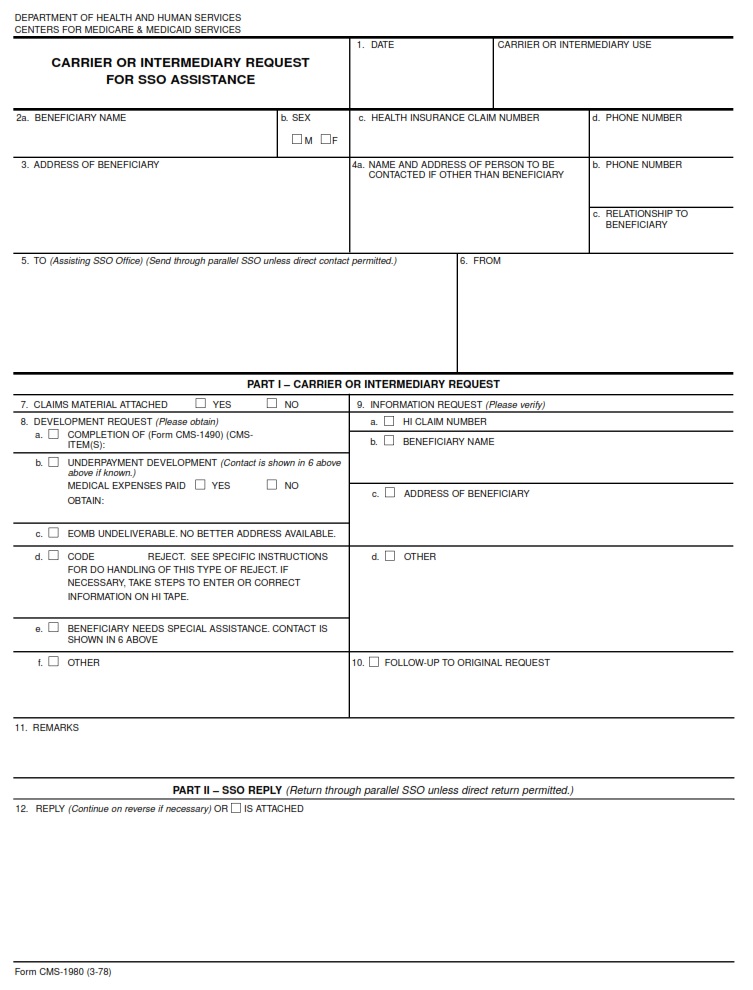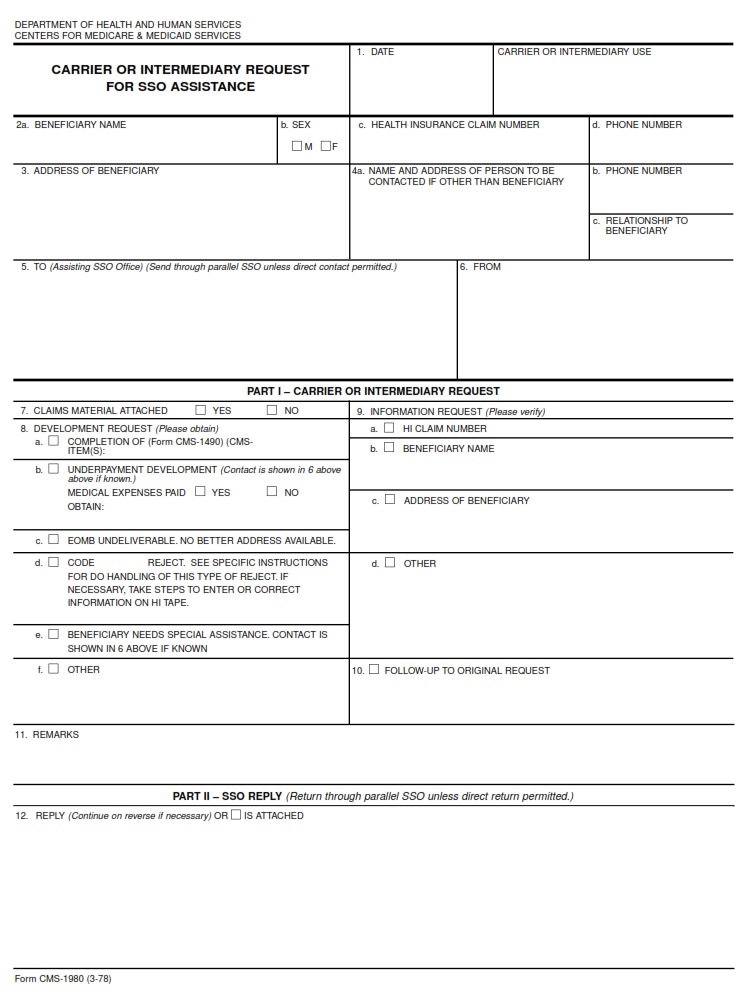CMSFORM.ORG – CMS 1980 – CARRIER OR INTERMEDIARY REQUEST FOR SSO ASSISTANCE – In the ever-evolving landscape of modern technology, the concept of Single Sign-On (SSO) has become a crucial element in streamlining access to various systems and applications. However, what if we took a journey back in time to the year 1980 when this revolutionary idea was just beginning to take shape within Content Management Systems (CMS)? Imagine being transported to an era where computers were bulky, internet was non-existent, and the term intermediary request carried a different connotation altogether. Join us as we delve into the intriguing world of CMS 1980 – where carriers and intermediaries sought assistance for SSO implementation, setting the stage for the digital revolution that would follow in the years to come.
Download CMS 1980 – CARRIER OR INTERMEDIARY REQUEST FOR SSO ASSISTANCE
| Form Number | CMS 1980 |
| Form Title | CARRIER OR INTERMEDIARY REQUEST FOR SSO ASSISTANCE |
| Published | 1978-03-01 |
| O.M.B. | – |
| File Size | 15 KB |
CMS 1980 - CARRIER OR INTERMEDIARY REQUEST FOR SSO ASSISTANCE (1938 downloads )
What is a CMS 1980?
In the technology landscape of 1980, Content Management Systems (CMS) were a nascent concept that primarily revolved around document management and collaboration within organizations. These early CMS platforms focused on storing, organizing, and retrieving digital content to streamline business processes and enhance productivity. While the functionalities were limited compared to modern-day CMS systems, these pioneering solutions laid the foundation for the digital content management revolution that was yet to come.
One key characteristic of CMS in 1980 was their reliance on central servers and mainframe computers for storage and processing power. This centralized approach facilitated better control over access permissions and version control, ensuring data security in an era where digital information was becoming increasingly valuable. Additionally, CMS from this period often required specialized training to operate, reflecting the technical complexity of managing digital content at a time when computer literacy was not as widespread as it is today.
Where Can I Find a CMS 1980?
If you find yourself in search of a CMS 1980, the task can prove to be quite challenging. With technology advancements rendering older models obsolete, locating a CMS 1980 may require some ingenuity. One potential avenue to explore is vintage technology marketplaces or forums where collectors and enthusiasts gather to trade or sell rare items from the past. Additionally, reaching out to specialized electronics recyclers or companies that focus on refurbishing vintage equipment might yield positive results in your quest for a CMS 1980.
Another option worth considering is attending electronics and technology conventions or fairs where vendors sometimes showcase retro gadgets and devices such as the CMS 1980. These events provide a unique opportunity to network with individuals who share an interest in antique technology and might know of sources where vintage CMS systems are available. Embracing alternative channels like online auctions, estate sales, or even contacting historical technology museums could potentially lead you closer to obtaining a cherished piece of computing history like the elusive CMS 1980 system.
CMS 1980 – CARRIER OR INTERMEDIARY REQUEST FOR SSO ASSISTANCE
CMS 1980, the Carrier or Intermediary Request for SSO Assistance, is a pivotal document that plays a crucial role in streamlining the process of requesting assistance from the Single Sign-On (SSO) system. This CMS form serves as a bridge between carriers and intermediaries, ensuring seamless communication and coordination in accessing vital information through the SSO platform. By accurately completing this form, stakeholders can expedite their requests for support and unlock the full potential of the SSO system’s capabilities.
One key aspect to consider when utilizing CMS 1980 is the importance of providing clear and detailed information regarding the assistance needed. This ensures that all parties involved are on the same page and can work effectively towards resolving any issues or queries. Additionally, understanding the nuances of using this form can significantly enhance organizational efficiency and productivity by leveraging technology to streamline processes effortlessly.
In today’s fast-paced digital landscape, embracing tools like CMS 1980 is essential in navigating complex healthcare systems efficiently. By mastering these forms and optimizing their utilization within carrier-intermediary relationships, organizations can minimize delays, resolve issues promptly, and ultimately deliver superior service to beneficiaries. The power of CMS 1980 lies in its ability to facilitate collaboration and communication between stakeholders seamlessly – making it an invaluable asset in modern healthcare operations.

